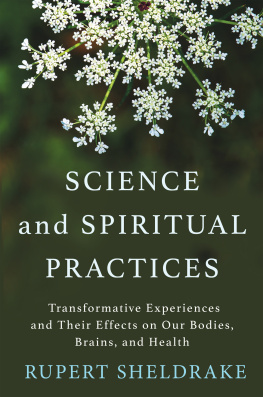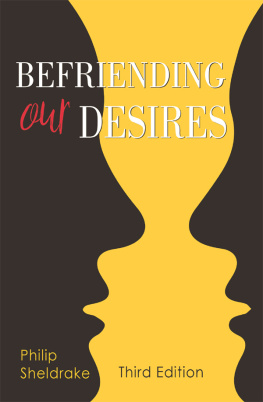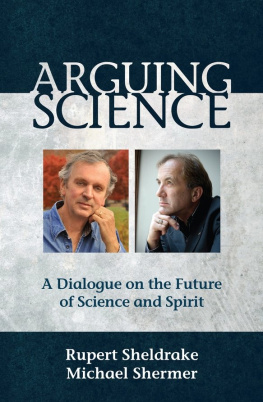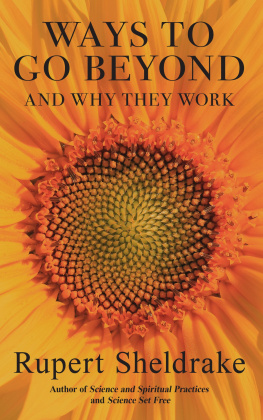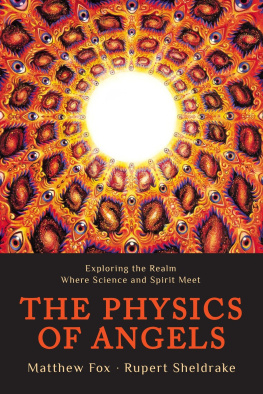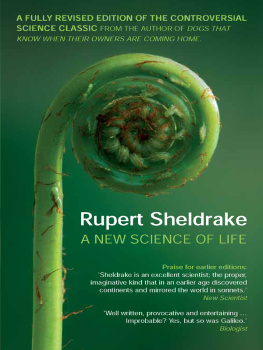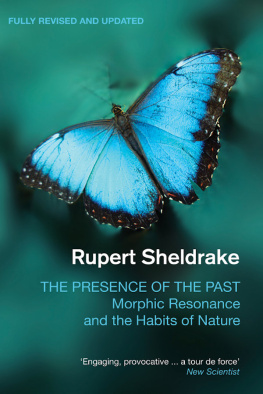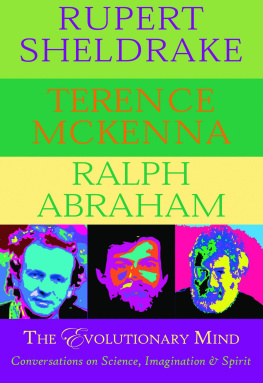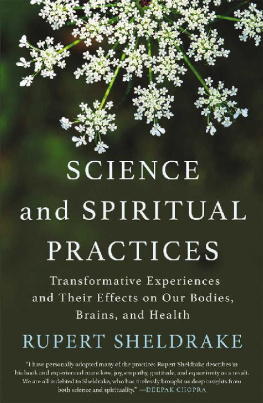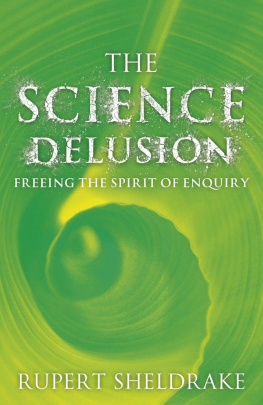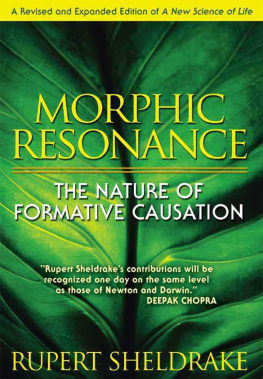

ALSO BY RUPERT SHELDRAKE
A New Science of Life
The Presence of the Past
The Rebirth of Nature
Seven Experiments That Could Change the World
Dogs That Know When Their Owners Are Coming Home
The Sense of Being Stared At
Science Set Free ( The Science Delusion in the U.K.)
WITH TERENCE MCKENNA AND RALPH ABRAHAM
Chaos, Creativity and Cosmic Consciousness
The Evolutionary Mind
WITH MATTHEW FOX
Natural Grace
The Physics of Angels
WITH KATE BANKS
Boys Best Friend
WITH MICHAEL SHERMER
Arguing Science

Science and Spiritual Practices
Copyright 2017 by Rupert Sheldrake
First published in Great Britain in 2017 by Coronet
An Imprint of Hodder & Stoughton
A Hachette UK Company
First Counterpoint Edition: 2018
All rights reserved under International and Pan-American Copyright Conventions. No part of this book may be used or reproduced in any manner whatsoever without written permission from the publisher, except in the case of brief quotations embodied in critical articles and reviews.
Library of Congress Cataloging-in-Publication Data
Names: Sheldrake, Rupert, author.
Title: Science and spiritual practices : transformative experiences and their effects on our bodies, brains, and health / Rupert Sheldrake.
Description: First Counterpoint edition. | Berkeley, California : Counterpoint, 2018. | Includes bibliographical references and index.
Identifiers: LCCN 2018002867 | ISBN 9781640091177 | eISBN 9781640091184
Subjects: LCSH: MedicineReligious aspects. | HealthReligious aspects. | Spiritual life.
Classification: LCC BL65.M4 S468 2018 | DDC 201/.65dc23
LC record available at https://lccn.loc.gov/2018002867
Jacket designed by Nicole Caputo
Book designed by Jordan Koluch
COUNTERPOINT
2560 Ninth Street, Suite 318
Berkeley, CA 94710
www.counterpointpress.com
Printed in the United States of America
Distributed by Publishers Group West
10 9 8 7 6 5 4 3 2 1
In grateful memory of my parents, Reginald and Doris
CONTENTS
PREFACE
T his book is the result of a long journey through the realms of science, history, philosophy, spiritual practice, theology, and religion, as well as physical journeys through Britain and Ireland, continental Europe, North America, Malaysia, India, and other parts of the world. Science and spiritual practices have been part of my life since I was a child, and I have thought about the relationships between them in many different contexts.
I was born and grew up in Newark-on-Trent, Nottinghamshire, a market town in the English Midlands. I had a fairly conventional Christian upbringing. My family was Methodist, and I went to an Anglican boarding school for boys.
From a very early age I was interested in plants and animals. I kept many kinds of animals at home. My father was an herbalist, microscopist, and pharmacist, and he encouraged my interests. I wanted to be a biologist and I specialized in science at school. Then I went to Cambridge University, where I studied biology and biochemistry.
During my education, I realized that most of my science teachers were atheists and that they regarded atheism as normal. In England at that time, science and atheism went together. An atheist outlook seemed to be part of the scientific worldview, which I accepted.
When I was seventeen, in the gap between leaving school and going to university, I worked as a lab technician in the research laboratories of a pharmaceutical company. I wanted to have research experience. When I took the job, I did not know that I would be working in a vivisection facility. I wanted to be a biologist because I loved animals. But now I was working in a kind of death camp. None of the cats, rabbits, guinea pigs, rats, mice, or day-old chicks that were used in the experiments ever left the lab alive. I experienced a great tension between my feelings for the animals and the scientific ideal of objectivity, which left no place for personal emotions.
After I expressed some of my doubts, my colleagues reminded me that this was all for the good of humanity; these animals were being sacrificed to save human lives. And they had an undeniable point. All of us benefit from modern medicines, and almost all of these drugs have been tested on animals first. It would be irresponsible and illegal to test untried, potentially toxic chemicals on humans. Humans have rights, so the argument goes. Laboratory animals have almost none. Most people implicitly support this system of animal sacrifice by benefiting from modern medicine.
Meanwhile, I read Sigmund Freud and Karl Marx, who reinforced my atheist views, and when I went to Cambridge as an undergraduate I joined the University Humanist Society. After going to a few meetings, I began to find them dull, and my curiosity took me elsewhere. The event that has stuck most in my mind was an address by the biologist Sir Julian Huxley, a leading light of the secular humanist movement. He argued that humans should take control of their own evolution and improve the human race by eugenics, namely selective breeding.
He foresaw a new breed of genetically enhanced children, who would be fathered by artificial insemination using donated sperm. He enumerated the qualities that the sperm donors should have in order to create this uplift in humanity: They should be men who come from a long, scientific lineage, who have great personal achievements in science, and who have risen to a position of high esteem in public life. The ideal sperm donor turned out to be Sir Julian himself. I later learned that he practiced what he preached.
As an atheist and as a budding mechanistic biologist, I was expected to believe that the universe was essentially mechanical, that there was no ultimate purpose and no God, and that our minds were nothing but the activity of our brains. But I found all this a strain, particularly when I fell in love. I had a beautiful girlfriend, and in a phase of intense emotion, I was going to physiology lectures on hormones. I learned about testosterone, progesterone, and estrogen, and how they affected different parts of male and female bodies. But there was a huge gap between the experience of being in love and learning these chemical formulae.
I also became increasingly aware of the great gulf between my original inspirationan interest in living plants and animalsand the kind of biology I was being taught. There was almost no connection between my direct experience of animals and plants and the way I was learning about them. In our laboratory classes, we killed the organisms we were studying, dissected them, and then separated their components into smaller and smaller bits, until we got down to the molecular level.
I felt that there was something radically wrong, but I could not identify the problem. Then a friend who was studying literature lent me a book on German philosophy containing an essay on the writings of Johann Wolfgang von Goethe, the poet and botanist. I discovered that Goethe, at the beginning of the nineteenth century, had a vision of a different kind of sciencea holistic science that integrated direct experience and understanding. It did not involve breaking everything down into pieces and denying the evidence of ones senses.
Next page
